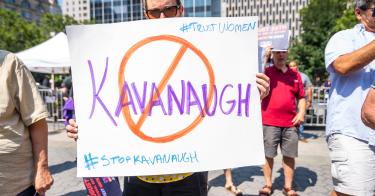In the final days before Supreme Court nominee Brett Kavanaugh appears before the Senate Judiciary Committee, groups opposing his nomination are publishing reports and other evaluations of his record. One of those groups, the Alliance for Justice, has posted what it calls a “fact sheet.” But the items posted are most certainly not facts.
This sheet reflects the Left’s totally political view of the courts. When it comes to court decisions, they care less about upholding the rule of law and more about who wins, who loses, which groups are favored, and which political interests are advanced. Their mantra is: The political ends justify the judicial means. Never mind what the law says, judges are supposed to deliver the political goods no matter what.
In 2005, when President George W. Bush nominated John Roberts to be chief justice, Senator Ted Kennedy (D., Mass.) said that the “real question” is “whose side is Judge Roberts really on?”
The AFJ “fact sheet” devotes itself to providing often fanciful answers to Kennedy’s question. For example, it claims that Kavanaugh “would protect the wealthy and powerful over rights of all.” They mention several cases that Kavanaugh has handled, but offer not a word about what the facts, the issues, or the law might have been in those cases. All they offer is the fact that they don’t like the way he decided those cases. It seems that objective facts, the issues, and the law don’t matter — it’s whose side the judge is really on!
The fact that Kavanaugh “dissented from rulings upholding the Affordable Care Act” proves, says the AFJ, that he would protect the wealthy and powerful. The first ruling in this category was in a case titled Seven-Sky v. Holder, a constitutional challenge to Obamacare’s mandate that individuals buy government-approved health insurance. The court upheld the Obamacare insurance mandate as a valid exercise of Congress’s power to regulate interstate commerce.
Kavanaugh believed that Obamacare’s penalty for not buying health insurance could instead be characterized as a tax. Another federal law, the Anti-Injunction Act, prohibits challenging tax statutes until after the taxes are imposed and collected. For that reason, he wrote, this lawsuit was premature. As we all know, the Supreme Court later upheld Obamacare by doing what Kavanaugh did, treating the penalty as a tax.
The AFJ also claims that Kavanaugh would protect the wealthy and powerful, using as proof his dissent in Sissel v. U.S. Dept. of Health & Human Services (2015). This challenge to Obamacare argued that it was a “bill for raising revenue” that the Constitution requires must originate in the House of Representatives. A three-judge panel concluded that Obamacare was not a “bill for raising revenue” and the full court voted against reconsidering that decision.
Joined by three other judges, Kavanaugh thought that the full court should have reconsidered the case. He believed that Obamacare is indeed a bill for raising revenue, but that it properly originated in the House of Representatives. In other words, while he disagreed with one reason for upholding Obamacare, he would have upheld Obamacare for a different reason.
Since when does arguing that a challenge to Obamacare should be dismissed and offering two different theories that could be used to uphold Obamacare amount to “dissent[ing] from . . . upholding” Obamacare? Does yes also mean no and up also mean down?
One of Kavanaugh’s D.C. Circuit colleagues, Judge Harry Edwards, wrote about their court in 1998 and offered a warning that applies fully to groups putting out such nonsense today: “Giving the public a distorted view of judges’ work is bad for the judiciary and the rule of law.”
This piece originally appeared in National Review



